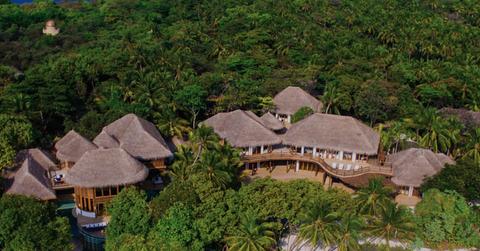This Luxury Hotel Is Working To Bring Sustainable Tourism To The Maldives
Controversial development is causing conflict in the beautiful archipelago, but one hotel builder thinks they have a way to satisfy both the nation and the environment's needs.
Updated May 20 2019, 3:48 p.m. ET
The Maldives are composed of beautiful islands set in pristine blue waters; many of those islands are undeveloped and uninhabited. However, a recent government initiative means a burst of development to support tourism, which is one of the nation's main sources of income. The Independent reports that this decision has been hotly contested, with Tourism Minister Mahmoud Shaugee resigning after it was announced that 31 more islands would soon have hotels built on their shores.
"There is only so much that an economy can absorb," he said. "I think it is important that we protect the future of the tourism industry for the people of the Maldives ... I have not specifically detailed the reasons for my resignation but I shared with journalists here that I have a difference of opinion with the government's policy. There are certain issues I have a difference of opinion over and I do not want to move forward with those policies."
This is a serious issue: What attracts tourists to the Maldives is its unspoiled beauty, and the preservation of its unique ecosystems should be paramount. But the archipelago also needs the business brought by visitors to sustain its economy. With that in mind, the builders of Soneva Fushi have created a luxury hotel designed to protect the island wonders around it, and are working towards making their establishment zero-waste through their innovative recycling program.
Fast Company interviewed Soneva Fushi's CEO Sonu Shivdasani, who founded their hotel in 1995. Even then, before sustainable tourism became an important topic of discussion, Shivdasani and his wife Eva considered their impact on the area as they built up their hotel. But they've still come a long way.
“We didn’t cut any trees down, we moved buildings, changed the architecture slightly to fit in among the trees,” says Shivdasani. “What we were doing back in 1995 would be like 20 out of 100 now in terms of all the different things we’re doing now.”
In 2008, the hotel built the first solar array in all of the Maldives, and plans to achieve its goal of getting 75 percent of its energy from renewables within the next year. They're also on the path to becoming carbon-neutral, and have a recycling program that processes 90 percent of the hotel's solid waste. They even process glass, food waste, jungle trimmings, and polystyrene with their own own pyrolysis system. They are working on the final 10 percent, which includes items like plastic, paper, and cloth.
Interestingly, they've turned some aspects of recycling into an activity for guests, inviting glass artists to come and turn the broken down wine and water bottles into art. They have moved on to workshops where guests turn leftover plastic into souvenirs of their time at Sovena Fushi.
The hotel also aims to have an eco-friendly menu, and charges guests an additional fee to pay for eco-friendly measures, such as planting trees in Thailand. The fee has raised about 5 or 6 million dollars over the years, according to Shivdasani.
Soneva Fushi may not be the cheapest ticket to the Maldives, but it's an example of how there is a market for both tourism and island stewardship, as well as a map.
